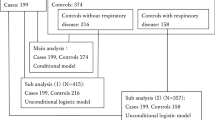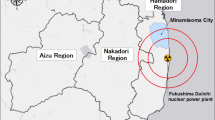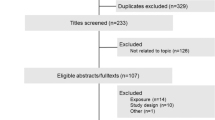Abstract
This study examined the association of green tea consumption with influenza among Japanese workers in the Kanto and Tokai areas. We conducted a case-control study in a cohort of 4302 workers. Consumption frequency of green tea in 2011 and physician-diagnosed influenza that occurred over the winter season from November 2011 through April 2012 were ascertained using a self-administered questionnaire. Two controls matched by company, sex, and age (and checkup date in one company) were randomly selected for each case. Odds ratio of influenza were estimated by conditional logistic regression. One hundred and seventy-nine cases and 353 controls with complete data were included in the analysis. Green tea consumption was significantly associated with decreased odds of developing influenza; the multivariable-adjusted odds ratio for green tea consumption of ≥5 cups/week was 0.61 (95% CI 0.39–0.95) compared with <1 cup/week (P for trend = 0.028). When analysis was restricted to cases confirmed using a diagnostic kit, the corresponding value was 0.68 (95% CI 0.39–1.18; P for trend = 0.16). Our data suggest that green tea consumption is associated with a lower risk of influenza. The present findings require confirmation in large-scale prospective studies using diagnostic tool for influenza infection.
This is a preview of subscription content, access via your institution
Access options
Subscribe to this journal
Receive 12 print issues and online access
$259.00 per year
only $21.58 per issue
Buy this article
- Purchase on Springer Link
- Instant access to full article PDF
Prices may be subject to local taxes which are calculated during checkout
Similar content being viewed by others
References
WHO. Influenza (Seasonal). Geneva, Switzerland: WHO; 2018. https://www.who.int/en/news-room/fact-sheets/detail/influenza-(seasonal).
Furushima D, Ide K, Yamada H. Effect of tea catechins on influenza infection and the common cold with a focus on epidemiological/clinical studies. Molecules. 2018;23:1795.
Nakayama M, Suzuki K, Toda M, Okubo S, Hara Y, Shimamura T. Inhibition of the infectivity of influenza virus by tea polyphenols. Antivir Res. 1993;21:289–99.
Song JM, Lee KH, Seong BL. Antiviral effect of catechins in green tea on influenza virus. Antivir Res. 2005;68:66–74.
Park M, Yamada H, Matsushita K, Kaji S, Goto T, Okada Y, et al. Green tea consumption is inversely associated with the incidence of influenza infection among schoolchildren in a tea plantation area of Japan. J Nutr. 2011;141:1862–70.
Delabre RM, Lapidus N, Salez N, Mansiaux Y, de Lamballerie X, Carrat F. Risk factors of pandemic influenza A/H1N1 in a prospective household cohort in the general population: results from the CoPanFlu-France cohort. Influenza Other Respir Viruses. 2015;9:43–50.
Matsumoto K, Yamada H, Takuma N, Niino H, Sagesaka YM. Effects of green tea catechins and theanine on preventing influenza infection among healthcare workers: a randomized controlled trial. BMC Complement Alter Med. 2011;11:15.
Nanri A, Nakamoto K, Sakamoto N, Imai T, Akter S, Nonaka D, et al. Association of serum 25-hydroxyvitamin D with influenza in case-control study nested in a cohort of Japanese employees. Clin Nutr. 2017;36:1288–93.
National Institute of Infectious Diseases. Influenza in 2011/12 season. Tokyo (Japan): National Institute of Infectious Diseases; 2012. https://www.niid.go.jp/niid/ja/flu-m/flu-iasrtpc/2912-tpc393-j.html.
Acknowledgements
We thank Daisuke Nonaka, Shamima Akter, Ngoc Minh Pham, Kayo Kurotani, Keisuke Kuwahara, and Ayami Kume (National Center for Global Health and Medicine, Japan) for their help with data collection.
Funding
This study was supported by a grant for National Center for Global Health and Medicine (23-114).
Author information
Authors and Affiliations
Contributions
AN and TM designed the research; AN, KN, NS, and TI conducted the survey; KN, NS, and TI provided databases for the research; AN performed statistical analysis; TM provided statistical expertise; AN drafted the manuscript; AN and TM had primary responsibility for the final content. All authors reviewed the paper and approved the final version.
Corresponding author
Ethics declarations
Conflict of interest
The authors declare that they have no conflict of interest.
Additional information
Publisher’s note Springer Nature remains neutral with regard to jurisdictional claims in published maps and institutional affiliations.
Rights and permissions
About this article
Cite this article
Nanri, A., Nakamoto, K., Sakamoto, N. et al. Green tea consumption and influenza infection among Japanese employees. Eur J Clin Nutr 75, 976–979 (2021). https://doi.org/10.1038/s41430-020-00792-3
Received:
Revised:
Accepted:
Published:
Issue Date:
DOI: https://doi.org/10.1038/s41430-020-00792-3
This article is cited by
-
What constitutes healthiness of Washoku or Japanese diet?
European Journal of Clinical Nutrition (2021)
-
Preventive effects of tea and tea catechins against influenza and acute upper respiratory tract infections: a systematic review and meta-analysis
European Journal of Nutrition (2021)



